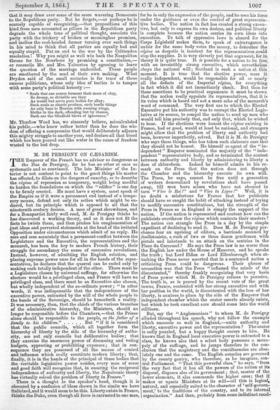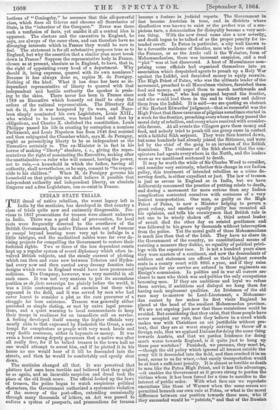M. DE PERSIGNY ON CIESARIS141.
THE Emperor of the French has no adviser so dangerous as the Due de Persigny, for he has no other at once so systematic and so convinced. The late Minister of the In- terior is not content to point to the great things his master has effected, to dilate on the dangers of anarchy, or to describe the regime of repression as temporary, weight being needful to harden the foundations on which the " ece" is one day to be firmly erected. He must have a system, must speak of the Empire as if it were a permanent end instead of a tempo- rary means, defend not only its action which might be en- dured, but its principle which is opposed to all that the nineteenth century desires. A man of great shrewdness, and for a Bonapartist fairly well read, M. de Persigny thinks he has discovered a working theory, and as it does not fit the facts he twists them, and then pitches his conglomeration of just ideas and perverted statements at the head of the irritated Opposition under circumstances which admit of no reply. He sees and sees accurately that a permanent conflict between the Legislature and the Executive, the representatives and the monarch, has been the key to modern French history, their struggle for ascendancy the cause of successive revolutions. Instead, however, of admitting the English solution, and placing supreme power once for all in the hands of the repre- sentatives, he declares that the quarrel can be ended only by making each totally independent of the other. There must be .a Legislature chosen by universal suffrage, for otherwise the electors would be a privileged class, and France will have no privileged class, and there must be an Executive also chosen, but wholly independent of the co-ordinate power ; "in other words, it was indispensable that the independence of the executive power, entrusted by the will of the whole people to the hands of the Sovereign, should be henceforth a reality. It was necessary, then, that the chiefs of the various branches of the administrative hierarchy, the Ministers, should no longer be responsible before the Chambers,—that the Prince alone should be responsible to the people, as the father of ,a family to his children." But "if it is considered that the public councils, which all together form the hierarchy of liberty by the side of the hierarchy of autho- rity, are not only councils but deliberative bodies ; that they exercise the enormous power of discussing and voting budgets, approving or prohibiting expenses ; that in con- sequence they are possessed of all the means of control and influence which really constitute modern liberty; that, finally, it is in the hands of the principal of these bodies that the veritable legislative power resides, every man of sense and good faith will recognize that, in assuring the reciprocal independence of authority and liberty, the Napoleonic theory has virtually solved the problem of liberty in France." There is a thought in the speaker's head, though it is obscured by a confusion of ideas shown in the simile we have italicized, and it would seem to be this. Liberty exists in France, thinks the Duke, even though all force is entrusted to one man, for he is only the expression of the people, and he uses his force under the guidance or even the control of great representa- tive bodies. The nation in fact has created a strong execu- tive, but only to express its own desires, and political liberty is complete because the nation carries its own ideas into execution. To talk of oppressive laws is absurd for the Corps Legislatif makes them, to speak of extravagance is unfair for the same body votes the money, to denounce- the re'gime as despotic is insolent for the representatives could stop the supplies. It is very cleverly put that argument, for in theory it is quits true. It is possible for a nation to be free; with an irresistibly strong executive, which nevertheless obeys the national will; Scotland is such a nation at this moment. It is true that the elective power, were it really independent, would be responsible for all or nearly all the defects of the Imperial regime, for everything in fact which it did not immediately check. But then for these assertions to be practical arguments it must be shown that the nation really appoints its representatives, that it is its voice which is heard and not a mere echo of the monarch's word of command. The very first use to which the Elected Executive put his authority was to corrupt the Elected Legis- lative at its source, to compel the nation to send up men who would tell him precisely that, and only that, which he wished to hear. If the elections were honest the regime existing in France, bad or good, would at least be national, and strangers might allow that the problem of liberty and authority had been, however imperfectly, solved. But it is M. de Persigny who says these things, who has taken such elaborate care that they should not be honest. He himself as agent of the " in- dependent " Emperor nominated the majority of the " inde- pendent " representative body, and so terminated the contest between authority and liberty by administering to liberty a dose of chloroform. Indeed he himself admits in his re- mark on the Press that the nation does not through the Chamber and the hierarchy execute its own will. The Press, he says, cannot be free until a generation of writers demoralized by revolutions shall have passed away, till men have arisen who have not shouted in turn " Vies is Roil" and " Vive la Ligue I" Well, it is no doubt a misfortune for France that her publicists should have so caught the habit of attacking instead of trying to modify successive constitutions, but the strength of the Press in France as in England is simply the support of the nation. If the nation is represented and content how can the publicists overthrow the regime which contents their masters ?
The nation can strangle the Press in a day by the simple expedient of declining to read it. Does M. de Persigny per- chance fear an uprising of editors, a barricade manned by feuilletonistes, a rush of two or three dozen gentlemen with pistols and inkstands to an attack on the sentries in the Place du Carrousel ? He says the Press law is no worse than the English law under the House of Hanover, and he speaks the truth ; but Lord Eldon or Lord Ellenborough when at- tacking the Press never asserted that in a contented nation a criticizing Press could be dangerous. Their phrase of accusation was that the Press "inflamed the minds of the discontented," thereby frankly recognizing that very basis of Press power which M. de Persigny refuses to perceive. The truth is, as is proved by the recent vote of the great towns, France, contented with her strong executive and with her position in the world, is discontented with the loss of her liberty, is anxious to place by the side of the Emperor that independent chamber which the orator asserts already exists, but which he took excellent care should come into the world stillborn.
But, say the "Anglomaniacs " to whom M. de Persigny alluded throughout his speech, why not follow the example which succeeds so well in England,—unite authority and liberty, executive power and the representation ? The orator is sadly puzzled, but a happy thought occurs to him. He knows that in England local executive power is entrusted to a class, he knows also that a select body possesses a mono- poly of the suffrage, and he jumps therefore to the con- clusion that the magistracy and the constituencies are abso- lutely one and the same. The English connties are governed by the county gentry, who therefore' as he imagines, con- trol Parliament. "That this powerful class," he says, "from the very fact that it has all the powers of the nation at its disposal, disposes also of its government ; that, master of the lower elements, it also commands the higher ones ; that it makes or upsets Ministers at its will—all this is logical. natural, and especially suited to the character of 'self-govern- merit,' to the traditions of the country, and to its internal organization." And then, probably from some indistinctrecoll lections of " Coningsby," he assumes that this all-powerful class, which fines all thieves and chooses all Secretaries of State, is the "inheritor of the Conquest." Never was there such a confusion of facts, yet amidst it all a central idea is apparent. The electors and the executive in England, he says, are always of the same class, and can therefore have no diverging interests which in France they would be sure to feel. The statement is for all substantive purposes true as to England, but why the assertion that a similar plan must break down in France? Suppose the representative body in France, chosen as at present, absolute as in England, to have, that is, the right of appointing every head of a department. Why should it, being supreme, quarrel with its own nominees ? Because it has always done so, replies M. de Persigny. Nothing of the kind. What it has done has been as in- dependent representative of liberty to quarrel with that independent and hostile authority the speaker is prais- ing to the skies. There never has been in France since 1789 an Executive which honestly set itself to obey the orders of the national representation. The Directory did not do it, for it was hampered by its wars, and Napo- leon simply nominated his own Legislature, Louis XIII., who wished to be honest, was bound hand and foot by obligations, and Charles X. abolished the constitution, Louis Philippe passed his life in creating by corruption a nominee Parliament, and Louis Napoleon has from 1848 first resisted and then subjugated the Chamber which, says M. de Persigny, ought as personifying liberty to be as independent as the Executive certainly is. The ex-Minister is in fact in his horror of making "liberty" absolute, 1. e., giving the repre- sentatives the right of nominating the Executive, seeking after the unattainable—a ruler who will consent, having the power, not to rule,—a household in which the father, having all authority, shall nevertheless, as he says, consent to "be respon- sible to his children." When M. de Persigny governs his household on that principle we shall believe it possible that independent authority and independent liberty, an absolute Emperor and a free Legislature, can co-exist in France.































 Previous page
Previous page